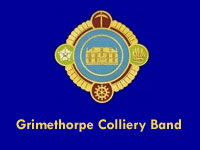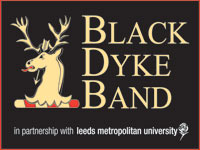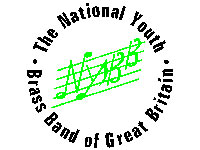Brass on Sunday Gala Concert
19-Sep-2007Symphony Hall, Birmingham
Sunday 16th September
Grimethorpe Colliery Band (Allan Withington)
Black Dyke Band (Nicholas Childs)
National Youth Brass Band of Great Britain (Bramwell Tovey)
Following Cory’s win in the 2007 Open Contest it fell to the Grimethorpe Colliery Band to open the Brass on Sunday Gala Concert. Taking to the stage to the accompaniment of a virtually unintelligible PA announcement, Allan Withington introduced the band, referring to those who had had an enjoyable day at the contest, and in particular those “thousands” who had enjoyed Grimethorpe’s performance, as opposed to the three men in the box who had not been so impressed, placing them fifth in a very competitive field.
Once the light-hearted banter was out of the way, the band presented two of the items that had been so well received at their recent appearance as part of the BBC Henry Wood Proms.
 Grimethorpe
Grimethorpe
Ralph Vaughan Williams’ “Overture, Henry the Fifth” dates from 1936 but was neglected for some considerable time before being rediscovered. In the unison opening the band produced a strong, full sound, especially in the bass section, with the bass trombone adding its own distinctive bite.
The bass melody exhibited some smooth playing, and the quiet passages were well controlled, the tempo stately and measured, with a suitably trumpet-like sound from the cornets, as suggested by the composer. The cornet fanfares, set against pedals from the trombone section, were precisely placed, and both Roger Webster and Kevin Crockford were on top form in their solos.
As the music moved on to depict the conflict between the opposing forces, the playing was vigorous without ever losing control, whilst the “Earl of Oxford’s March” was allowed to creep in with some excellent playing from the horn section, before building to the final climax. Special mention should be made of the four-man trombone section, whose contribution was first class.
Hans Werner Henze’s “Ragtimes and Habaneras” was commissioned by Elgar Howarth during his spell with the band, and has been described as “. . . an entertaining work for listeners who approach it with an open mind”. As in the Albert Hall performance, the band settled very quickly into the required style, and one could almost sense the smoky café atmosphere as the players relished in the smoochy writing.
Henze makes much use of various mutes to add to the tone colours available, and there was some effective slide vibrato from Jonathan Beatty on trombone, one of the featured soloists, alongside Andrew Holmes on flugel and Kevin Crockford on soprano. The frequently fragmented phrases were played confidently and convincingly, with delicate passages alternating with fierce rhythmic sections, whilst quirky and tongue-in-cheek phrases alternated with a full “big-band” sound. As the music drew to a close, with its echoes of Ibert’s “Divertimento” in the trombone writing, and Kurt Weill’s “Mack the Knife”, the band carried the audience along with them, demonstrating that even such a mixed audience can enjoy and appreciate what could be seen as quite a challenging work if it is properly introduced and presented.
For their solo spot, Grimethorpe introduced their fine euphonium player, Michael Dodd (not Dodds, as he pointed out to Allan following the introduction!), to perform Donald Hunsberger’s arrangement of “Believe Me if all those Endearing Young Charms”, the solo which won him the soloist’s prize at Brass in Concert 2006.
From the sensitive introduction by the back row, with a delicate contribution on glockenspiel, this item was a real joy to listen to, as the solo line maintained its musical shape throughout, even when considerably embellished and decorated. Michael’s understated rendition brought tumultuous applause from an appreciative audience.
Grimethorpe’s programme ended with Frank Wright’s transcription of Berlioz’ overture, “Les Francs Juges”, the work with which they won the 2006 National Championships. There was much subtlety in the opening bars, with excellent solos from horn and baritone, and the trombone octaves were very effective.
Menacing rises and falls in the lower band led to some very measured scales across the band, with much made of the contrasting dynamics, and with Kevin Crockford once more in imperious form. Not even a dropped mute could take anything away from what was a first-class all-round performance.
 Black Dyke
Black Dyke
The change round of bands was carried out very smoothly and so with no undue delay Black Dyke took their places and commenced with Paul Lovatt-Cooper’s popular “Where Eagles Sing”. The opening was very slick, with some fine work from the back row cornets against the fearsome euphonium ostinato. All sections of the band were given their head, and this time it was Peter Roberts’ opportunity to soar over the top of the band. At the conclusion, there was particular recognition for euphonium player John French and the composer, stepping forward from his place in the percussion section.
Spanish music has its own distinctive appeal and flavour, even when composed by non-Spaniards, and none more so than Rimsky-Korsakov’s “Capriccio Espagnol”, recently arranged in an abridged version by Keith Wilkinson, currently working as a music director for the Salvation Army in the USA. The tambourine was prominent right from the opening bars, with delicate solos from euphonium and cornet contrasting with the crisp cornet fanfares, nicely balanced between the parts. The impetus was maintained throughout the busy writing, with the trombones cutting through the texture most effectively.
In a change to the advertised programme, Richard Marshall opted to play Steven Bulla’s arrangement of “Blessed Assurance”. Written for flugel and trumpet, the opening passages lie fairly low in the register, and Richard did not seem fully at home, picking up the instrument cold. This changed as the music progressed, with his customary confident and secure trumpet playing, culminating in the run up to the final top “F” which thrilled the audience.
Two items followed from the pen of Elgar Howarth, both being transcriptions of Jacobean music. “The Earl of Salisbury’s Pavanne” was slow and stately, exploiting the various tone colours available, with particular prominence given to flugel, horns, baritones and euphoniums at the opening. As the music became more intricate, the decorative runs were tucked in neatly, flowing smoothly throughout the band.
“The King’s Hunting Jig” was much livelier, with a bright opening from cornets and trombones, before the more mellow instruments joined in. There were some extreme contrasts of volume, where pianissimo echoing phrases were barely imperceptible, emerging from the resonance of the previous fortissimo passages.
Having offered congratulations to Cory and his brother Robert – implying he had to say that to keep their mother happy, but stressing that the sentiments were sincerely meant! – Nicholas Childs introduced the band’s final programmed item.
Peter Graham wrote “Renaissance” as a follow-up to his popular piece “Shine as the Light”, played in the 2006 concert by the YBS Band. It shares several characteristics with its predecessor, and they both feature one of Joy Webb’s vocal compositions, in this case her song “Come into our World”. The opening of “Renaissance” could have been written for Black Dyke, with its prominent writing for the bass section, before the cornets and glockenspiel enter with an ostinato figure which could have been lifted straight from the earlier work. Following brief references to “Come into our World” the tune “Laudes Domini (When morning gilds the skies)” is introduced.
Vibraphone, euphonium and trombone solos led up to Richard Marshall’s rendition of “Come into our World”, and there was also some excellent playing from Arfon Owen on horn. An intricate pattern was established on cornets, trombones and percussion as the music built towards the triumphant return of the tune, with its final phrase “May Jesus Christ be Praised”.
As has become customary at the Brass on Sunday concerts, Nicholas Childs had allowed time for an encore at the end of Black Dyke’s programme, a rendition of the “Finale from William Tell” that certainly lived up to its description as a gallop! Taken at a cracking pace, with particularly clean double tonguing throughout the band, and with the pace never allowed to flag, Richard Marshall’s solo was breathtaking, and the band had certainly earned all the applause they received.
 National Youth Band of Great Britain
National Youth Band of Great Britain
After the interval, the final band taking part was the National Youth Brass Band of Great Britain, under the direction of Bramwell Tovey. Once the eighty members had taken their places, Bramwell Tovey made reference to the recent passing of Bill England, before they played Elgar’s “Nimrod” in tribute to his work with the band over the years. The playing was beautifully controlled, with a fine solo from Paul Duffy, currently on the front row at Black Dyke (and having a very busy weekend!), and a long pause on the final chord.
Their first programmed item was William Rimmer’s “Punchinello”, in which they settled nicely into the 6/8 rhythm at the start, and made the contrasts between the alternating passages in compound and simple time. The rhythms throughout were very precise, and the sections were well-balanced.
Bramwell Tovey then introduced Malcolm Arnold’s “Little Suite for Brass”, explaining that when it had been suggested as a possible item to Denis Wright, he had felt it was not suitable, as it was too modern!
The three movements certainly hold no terrors these days, with the central “Siciliano” being widely recognised as one of the gems in brass band literature. The band’s playing was very sensitive, never over-powering the soloist, and bringing out the poignancy so characteristic of the composer. The first movement was marked by some fine xylophone playing, and the opening to the third movement was suitably cheeky and impertinent.
Dudley Bright had visited the band’s recent course to conduct a master class, and he was the soloist in Erik Leidzen’s “Concertino for Trombone and Band”, a more reflective solo than some of his Airs Varies, and one with a very demanding accompaniment. From the opening forte-pianos it was clear that the band had been well-drilled, and the subtleties of the writing were well-observed. It was a very musical reading from both soloist and band, and the occasional fluffed note only went to show that Dudley is human after all!
Bramwell Tovey conducted the premiere of John Pickard’s “Wildfire”, one of the four movements of his “Gaia Symphony”, with the National Youth Orchestra of Wales. The composer is a persuasive advocate of his own music, and his introduction provided an interesting insight into the piece, not least his confession that, if he were writing now, he would adjust the range of some of the parts, which he felt were a little too demanding.
From the opening trills on cornets and muted horns the band captured the atmosphere of the work well, although some of the contributions from the whip seemed a little lack-lustre. The concentration of the young players was plain for all to see, particularly through the changing metres and, on what had been a good afternoon for soprano players, Rebecca Crawshaw, on her last appearance with the band following sixteen NYBBGB courses, made a fine contribution. With the second outbreak of fire, there was some confident work on the tom-toms before the music rose to its final climax.
Wilfred Heaton wrote his hymn tune setting “Just as I am” at the age of eighteen, showing considerable maturity as he reflects on individual phrases of the melody. The tricky cornet opening was neatly shaped, although on this occasion the doubling of parts was not entirely successful, particularly in the trombone duet where the playing was not quite as effective as it would have been with a single player on each part. The climaxes were carefully managed, with a full band sound at the final statement of the tune, and a nicely balanced cornet chord to close.
Cyril Jenkins’ “Life Divine” was presented as a massed band item by Faireys and Fodens at the Harry Mortimer Centenary Gala Concert on the day following the 2002 Open.
Originally entitled “A Comedy of Errors” the title was changed by the publisher, probably a sensible move, as at the time many players felt the work was unplayable. It certainly tests all the players throughout the band, and still presents a challenge today. The NYBBGB made a confident start, with crisp rhythms and neat articulation, the music being taken at a brisk pace but the band staying nicely together. There was some fine solo work, particularly from trombone, baritone and cornet, and the band as a whole produced a very mature reading, sustaining the sound right to the last section, which Bramwell Tovey pulled right back, before the final “race for home”.
The audience were clearly anticipating an encore, and it was not real surprise when the band launched into a march, but this soon turned to smiles as instruments were put down and it turned into a vocal rendition, carried out with great enthusiasm and many smiles, not least at the three lads on soprano negotiating their runs up into the stratosphere!
After acknowledging those members who were appearing with the and for the last time, the concert closed with a sensitive rendition of the hymn tune “St Clements”. Bramwell Tovey had already referred to the band’s use of hymn tunes at the start of rehearsals and the fruit of that work was there for all to see as they played three verses, the euphoniums producing a beautifully clear sound in the middle verse and the steady bass note leading into the final verse being on a par with the best bands.
With such fine playing, and with a number of quite young players in the band, it is clear that the future of banding is in good hands. Three and a half hours after the concert began, the audience left the hall having enjoyed a well-balanced musical feast, with many clearly making plans to return to future concerts.
Peter Bale









